
Uncle Tung and I enlisted in the army at the same time. The day we left, the sun had not yet risen above the bamboo trees. Everywhere was still covered in a thick layer of early morning mist, as opaque as smoke. A military vehicle, heavily camouflaged, was parked under a cotton tree at the village entrance to welcome us.
Most of the neighbors came out to see off the new soldiers. My wife held our five-month-old daughter by her side. Her five-year-old brother was holding me by the neck. The whole family huddled together, reluctant to leave. Uncle Tung’s mother, her back slightly bent, tried to lift her silver-spotted head, opening her dim, longan-like eyes to look closely at her son’s face. With one hand she carried the backpack, with the other she patted his back, firmly urging: “Go, you must be strong, your brothers are waiting in the car.” She stammered the same sentence several times, her mouth urging but Uncle Tung’s arm was tightly held by her.
It was early March, and the kapok tree at the village entrance was already a bright red. From the top of the tree to the thin, drooping branches, clusters of flickering flames hung everywhere. The wind from the Nguon River blew through the treetops, and many flowers fell onto the bottom of the car, landed on the tops of backpacks, and on the shoulders of the new recruits still fumbling in their brand new khaki uniforms.
Many times the kapok tree in my village joined the villagers in tearfully seeing off their children to join the army every blooming season. It felt as if the tree was also filled with love, also writhing to tear out from its trunk the drops of pure, fresh blood that would give us the strength to confidently go to war.
Sitting next to me, Uncle Tung held up his two hands to receive a cotton flower still wet with morning dew, and held it to his chest. Breathing a hot breath in my ear, he let out a lingering sentence: “The cotton flower is also called the cotton flower.” I knew he was anxiously missing his 12th grade classmate named Mien.
I asked: “Why didn’t Mien come to see me off?” His voice was hoarse: “Today was Mien’s turn to be on duty, he had to be at the battery from four in the morning. Last night we were sobbing and talking behind this cotton tree. After midnight, when we said goodbye, Mien stuffed into my shirt pocket the Anh Hung pen and a stack of cellophane paper, then suddenly twisted my neck and bit my shoulder painfully.
I pretended to cry: Blood is all over your shirt. She gasped: Never mind! I hope it becomes a scar, so you will always remember Mien. Unable to find any words of encouragement, I could only silently hold my uncle's student's hand, which was as soft as a noodle. I silently told myself to always remember my grandmother's words from last night: "You are still very weak, you must always support and protect him in all difficult situations, I rely on you."
Before leaving the village, my heart sank, filled with homesickness. When the car started moving, I heard many suppressed sobs under the canopy of the old cotton tree, which was in full bloom with its beautiful flowers. We had to control our emotions, stood up together, raised both hands, and shouted loudly: “See you again on the day of victory.”
My grandfather had ten siblings. Uncle Tung's father was the youngest. I am five years older than Uncle Tung. In my extended family, it has always been normal for those with several children to call a child in his senior class as uncle or aunt. This has always been the case.
Uncle Tung's father died in 1948 during the night when the army attacked Tam Chau garrison. He was only four years old at the time. His mother has been raising him alone ever since. After graduating from high school last year, being the only blood of a martyr, he was given priority for a place to study abroad in the Soviet Union, which many people coveted. He refused, bit his fingertip, used his blood to write a letter of determination to volunteer to go to the battlefield to fight against the Americans. His mother had to sign the application to confirm her agreement, then the policy committee approved his enlistment in the first batch this year.
My uncle and I were assigned to the same squad. We went through many battles together on the battlefields of several provinces in the Southeast. Thanks to our ancestors' blessings, over the past four years, my uncle and I have never been hit by a single piece of shrapnel. We only had a few bouts of malaria and a few injuries from bomb blasts, and then our health returned to normal.
This March, after a military reorganization, Uncle Tung and I were sent by the unit to attend a special training class with dozens of soldiers from other units. Our group secretly crossed the Saigon River and marched to Base R. We traveled at night and rested during the day under the canopy of the great forest.
It was 1970, the war was in its fiercest phase. That night, we had just crossed a dry stream when the liaison officer gave the order: “This section is a key point where enemy aircraft regularly scout and bomb, comrades must pay close attention, do not be subjective.
There have been quite a few casualties here.” I had just pushed my floppy hat back and was on high alert when I heard several flares explode overhead. My uncle and I quickly hid behind an old tree by the side of the trail. Uncle Tung whispered, “A kapok tree, a cotton tree, my friend!”
I touched the rough bark, my palms touched the sharp thorns. I suddenly remembered the kapok trees in my village, which must be in bloom this season. Looking up, countless kapok flowers were flickering in the flares, briefly extinguishing, briefly revealing beautiful torches.
There was a branch halfway up the tree, about the size of a plow, that had been blown off by a bomb and looked like a crippled arm pointing towards the crescent moon rising on the horizon, also dangling with clusters of dazzling flowers. It seemed that in that moment, Uncle Tung had forgotten all about the enemies in the sky, standing up straight with excitement, his two arms embracing half of the kapok tree, and excitedly blurting out a few words: “Mien! Mien! In the middle of the forest there are also kapok trees like in our hometown, my dear.”
Suddenly a flash of lightning appeared, I only had time to see a few bright spots reflecting on Uncle Tung's wide, black eyes. Then it was pitch black. Then everything was silent. My ears were deaf. The bomb exploded very close, the pressure from it pushed me down at the same time Uncle Tung's whole body fell heavily on my back. Blood from his chest sprayed, soaking my shirt, hot.
Uncle Tung died from a piece of bomb that pierced his heart, exited his back, and embedded itself deep into the trunk of a kapok tree. A piece of bark several hands long was peeled away, revealing a pale white trunk. In my hands, Uncle Tung could not utter another word.
Mien! Mien! Was my uncle's last call in this world. After the bombing, the forest returned to a terrifying silence. From above, the kapok trees poured down sorrowfully like rain, covering my uncle and I. The flowers were like drops of bright red blood, fluttering and dripping endlessly.
We laid Uncle Tung in a deep hole dug back into the trail, about ten meters away from the base of the cotton tree. I searched my backpack and changed him into the still-folded Suzhou khaki uniform he had been saving for the day he returned home from the North on leave. I also carefully put into my right breast pocket a bottle of penicillin containing his picture and the necessary information about a soldier written on the back.
I carefully put the blood-soaked cellophane paper and the Hero pen that Mien had given him into his left shirt pocket, where his heart was dripping with pure youthful blood. Before wrapping him in the blanket, we used our flashlights to look at him one last time.
His face was pale from blood loss, but the corners of his mouth had not yet closed, revealing a row of front teeth as even as corn kernels, shining in the light. A smile had not yet faded, a youthful smile forever etched in my memory. It seemed like he had not yet experienced pain, had not yet known that he would have to leave this world in his mid-twenties.
He fell down as if he were falling into his mother’s arms, peacefully falling into a long sleep. Without a tombstone, we found a laterite buried underground at the head of the grave. When we were done, the whole squad bowed their heads in silence and continued marching. Knowing that I was Uncle Tung’s nephew, the liaison officer gently told me: “This cotton tree is about two kilometers from the Tha La stream we just passed.
Also the road we are about to pass is about the same distance, take it as the coordinates”. As for me, I lingered by his grave, sobbing and praying: “Uncle Tung! Please rest in peace here. Here is a kapok tree, which will bloom a season of beautiful flowers every March. The soul of the homeland and the love and longing of your mother, of Mien and our extended family are always hidden in the shade of this tree, in the bursting March flowers, which will always warm your soul during the months and years you are still wandering in this place. After the day of victory, I will definitely come here to bring you back to rest with your ancestors, in the heart of your homeland”.
The only thing that remained of my uncle was the blood-stained backpack that I always carried with me during the war years. The first time I came home on leave, I had to restrain myself and put it away in a wooden chest tied to the beam. It was very painful for me to see a mother holding her child’s blood-stained memento.
After peace was restored, my wife informed me that the commune had held a memorial service for Uncle Tung several years ago. Aunt Mien also died a year after Uncle Tung on the Quang Tri battlefield. His mother, after many times of begging from the organization and my wife, came to live permanently in my house. My house was next to hers, so it was convenient for her to come home every day to burn incense before two pictures of beloved martyrs.
But she was showing signs of dementia. My wife wrote in a letter: “Every morning, she would go to the village entrance with a sickle in hand and a basket in her hand, sitting absent-mindedly under the kapok tree. When asked, she would say: I’m looking for some pigweed to help her and her children. I’m also waiting for Tung who is on his way home. After being away from home for so many years, he must have forgotten the way, how pitiful!”
It was not until March 1976 that I was given a month's leave by my unit. Sitting on the military train running from North to South, it was as slow as a turtle. Looking at the cotton trees in bloom on both sides of the road, my heart was filled with endless longing for Uncle Tung.
The situation at that time was still complicated, not allowing me to go to find my uncle's grave. How should I tell my grandmother? I got off at the station in NB town at midnight, shouldered my backpack and walked, and at dawn I arrived at the cotton tree at the village entrance. Uncle Tung's mother was the first relative I met, and she was at the same place eleven years ago. She held onto Uncle Tung's shirt and urged: "Go, my child, your legs will be strong and your stones will be soft. Your friends are waiting on the bus."
Knowing her condition, I still couldn’t hold back my tears. I held her hand and told her my name. She dropped the sickle and the basket, hugged me tightly and cried: “That unfilial son Tung, why didn’t he come back to me? He left his mother alone and old like this. Oh my son.”
Knowing that she was in a daze, I pretended to ask her to take me home, saying that I had forgotten the gate. As if suddenly waking up, she scolded: “Your father, wherever you go, you must keep your hometown in mind, that is the way of being a human. That is very bad.” Then she grabbed my arm again, whispering: “Go, you must be strong and brave.”
Just like holding Uncle Tung’s hand that morning. That morning, it was the season for the cotton trees to bloom. The wind from the Nguon River still blew through the treetops, and many cotton flowers fell like blood-colored tears on my grandmother and I’s heads. As if sharing, as if sympathizing.
My military career continued on the front line to protect the southwestern border, then fought against the Northern expansionists. In 1980, when things were peaceful, I was discharged. When I got home at noon, my wife was still in the field, and my children had not yet finished school. The three-room house was quiet and deserted, with only her sitting hunched over next to the jute hammock with her white hair tousled.
The backpack soaked in Uncle Tung’s blood that I brought back from a few years ago was neatly rolled up and placed in the hammock. With one hand she held the edge of the hammock and gently swayed it, while the other hand fanned the palm leaf fan. I spoke softly, she looked up and softly shushed: “Don’t speak loudly, let him sleep. He just came back. My son’s strength has diminished, yet he has had to struggle through the jungle of bombs and bullets for so many years. I feel so sorry for him!” I secretly turned my face away to hide my tears.
I asked about Uncle Tung's backpack, my wife explained: "It's very strange, honey. For several days, she kept pointing at the chest you tied to the beam and crying: Tung is in that chest. Please put him down with me. I feel so sorry for him. There was no way to hide it from her anymore, so I took it down, and as soon as she opened it, she hugged the backpack, sobbing with all kinds of love. From then on, she stopped wandering around. Every day she sat hunched over, rocking the hammock, whispering lullabies of sad songs."
I stayed home for a few days. At that time, Uncle Tung's mother was very weak. During the day, she rocked her baby in a hammock, and at night she muttered to herself: "Tung! Why don't you come back to Mom? Grandpa! Why don't you take me to find a way back to the village. I'm still very young. A student's body is like a weak bamboo shoot. How can I bear being sent to the battlefield forever, my child?"
At this rate, the old lady wouldn’t live much longer. The only way to find and bring Uncle Tung’s remains back to the village would be to help her recover somewhat. As long as I don’t fulfill this sacred duty, my conscience will be so guilty that I will forget to eat and lose sleep.
Thinking so, with this little rest, I was determined to set out to find and collect Uncle Tung's remains to rest with his father in the martyrs' cemetery in my hometown. One of my comrades was currently working at the Tay Ninh Provincial Military Command. I confidently set out, confident that I would complete the mission.
My comrade-in-arms wondered and discussed with me: “You only have a vague name of Tha La stream. There are several places called Tha La in this province. Do you know which Tha La? Crossing a shallow stream and then being bombed in the middle of the stream and the road blocking the direction of march, I guess it could be Tha La stream in Tan Bien.
There, a new economic commune has been established. If that kapok tree and Uncle Tung's grave are cleared and destroyed, it will be very difficult to find. I am busy studying the resolution for another week. The later the better. You can take my Six-Seven and go there first. I will call the guys in the district and the new economic commune to help."
I drove straight from Tay Ninh town to Tan Bien district. When I reached Dong Pan crossroads, I didn’t expect that a market with many people buying and selling had formed here. From there, there was a road that turned to the new economic commune and then to the Tha La stream bank. I was glad that I might have found the right place where my uncle died that year.
I was frantic with worry because after only four years of peace, the communication route that used to run under the forest trees now had no shade of any old trees. Before my eyes were endless green sugarcane and cassava fields, one after another. Were the traces of the past still intact?
Thank goodness, the kapok tree in the middle of the forest that had long sheltered my uncle’s hastily built grave was still there. It chirped and beckoned me with layers of brilliant flames that reflected in the cloudless blue sky of March. The stump of its branch that pointed toward the crescent moon that night still showed the same sorrow of a time of mourning.
The place where the bomb fragments had torn off a large part of the tree’s bark still revealed a deep, black hole stained with smoke. I guessed that the new economic zone started from the base of this tree. Many thatched houses with mud walls were all the same size and style, their fronts facing the straight red dirt road.
In each square of dirt yard, there were children wandering around with chickens and ducks. Parking my bike under the canopy of a kapok tree that shaded half the road, I stood nervously in front of the open bamboo gate, straining my eyes to look at the kapok tree nestled within the fence of a garden about three northern sao wide.
A small house, the front of which was made of newly sawn planks still retaining the reddish color of the wood. The entrance door was wide open with its two wooden panels. Sitting on the ground was a shirtless man. Or rather, only half a man. I noticed in time two short, black thighs sticking out from the two legs of his shorts.
A wooden board with the scrawled words: Tu Doan repairs locks, repairs cars and inflates and compresses tires hung on the top of the column where he sat. I said: “Sir, may I visit?” He answered softly, neither indifferent nor enthusiastic: “What’s the matter, do you need your car repaired?”. “No, but yes.”
I led the bike into the yard, lifted the center stand, and asked him to tighten the chain. It was too loose and kept making clicking noises. Moving by putting both hands on the wooden chair and throwing his whole body forward, the homeowner crawled to the bike's side. While he was busy tightening the screws, I started a conversation: "How long has it been since you had an accident?" "What kind of accident? I'm a disabled veteran.
In March 1975, I was still in the Republic Military Hospital. After the liberation, the Revolutionary Military Hospital continued to treat me until my wounds healed. In 1976, my wife and two children and I volunteered to come here to build a new economic village. We have lived leisurely until now.”
He asked again: “Where are you and your children?”. “Their mother goes to work peeling cassava husks for the starch processing plant. The two children go to school in the morning and work with their mother in the afternoon.” He asked again: “Is there much shortage?”. “If you know enough, then enough is enough. Vegetables from the garden. Rice from the market. Three full meals a day, a good night’s sleep.”
I pointed to the corner of the garden in front of the house where the grass was so thick that no trees could be planted because of the shade of the kapok tree. I asked: “I heard that back then, when we were clearing the forest to make a new economic zone, we cut down all the big and small trees, but why was this kapok tree left out?” “When I came to receive the house, I saw that tree there. I was wondering like you. I asked the people who came before, and they all said: It seems like there is some kind of spirituality. Every sawman who came to cut this tree down gave up with a pale face.
The team leader then clicked his tongue: Leave it there to bloom every season to beautify the landscape. Everyone fought for the house and the residential plot at the front of the commune. After a few days, they all asked to move to another house. When asked why, they all shook their heads in silence. My family arrived last and have lived there peacefully ever since.
There is one thing, tell the soldiers not to blame me for spreading superstition. It is true that I have asked a painter to cut down that cotton tree several times, but I could not bear to do so. Because every year, dozens of times I dream of a very young soldier coming from the cotton tree in the corner of the garden to my house and inviting me to go drinking.
Every drinking party was very crowded, regardless of the Liberation Army or the Republic of Vietnam Army, everyone hugged each other, danced and sang both yellow and red music. The next morning my breath still smelled of alcohol. But strangely enough, when I was with him I was a soldier with two legs, so happy and carefree. Whenever I hadn't seen him for a long time, I felt so sad and absent-minded.
Only then did I tell the truth: “Maybe that soldier is my uncle. Right there in the tangled grass, we buried my uncle more than ten years ago. There is still a laterite rock on the ground where we marked it. Thank you for keeping it intact so that I have the opportunity to bring my uncle back to his hometown.” Hearing that, Tu Doan almost fell over, his eyes widened, his mouth opened and he repeated: “It’s really Linh, it’s really Linh. We’ve been together for so long but we didn’t know to light incense for him on the full moon day. What a pity!”
I and Mr. Doan cleaned the grass in the corner of the garden. The top of the laterite rock protruded about ten centimeters above the ground. This proved that from that night until now, Uncle Tung's grave was still intact. I burned all the incense and arranged the offerings I brought from my hometown to place on top of the mound of earth. Kneeling on the ground, I bowed my head and clasped my hands to pay my respects to Uncle Tung three times, letting two streams of tears fall onto Uncle Tung's grave that had just been cleared of thorns.
Disabled veteran Tu Doan sat next to me, also bowed his head, tears streaming down his face, and said a few words: "I respectfully ask your spirit to forgive me for being with you for so long without even a stick of incense to offer." I consoled him: "It is not my fault if I do not know. The spirits of the departed are more tolerant and wise than us mortals, my friend!"
The incense on Uncle Tung’s grave was burning fiercely. The March noon was quiet and peaceful, the bright red cotton flowers quietly fell all over the ground. This year’s cotton flowers seemed unusually fresh, not as sad as the flower seasons when the country was still shrouded in smoke and fire.
VTK
Source



![[Photo] Closing of the 14th Conference of the 13th Party Central Committee](https://vphoto.vietnam.vn/thumb/1200x675/vietnam/resource/IMAGE/2025/11/06/1762404919012_a1-bnd-5975-5183-jpg.webp)



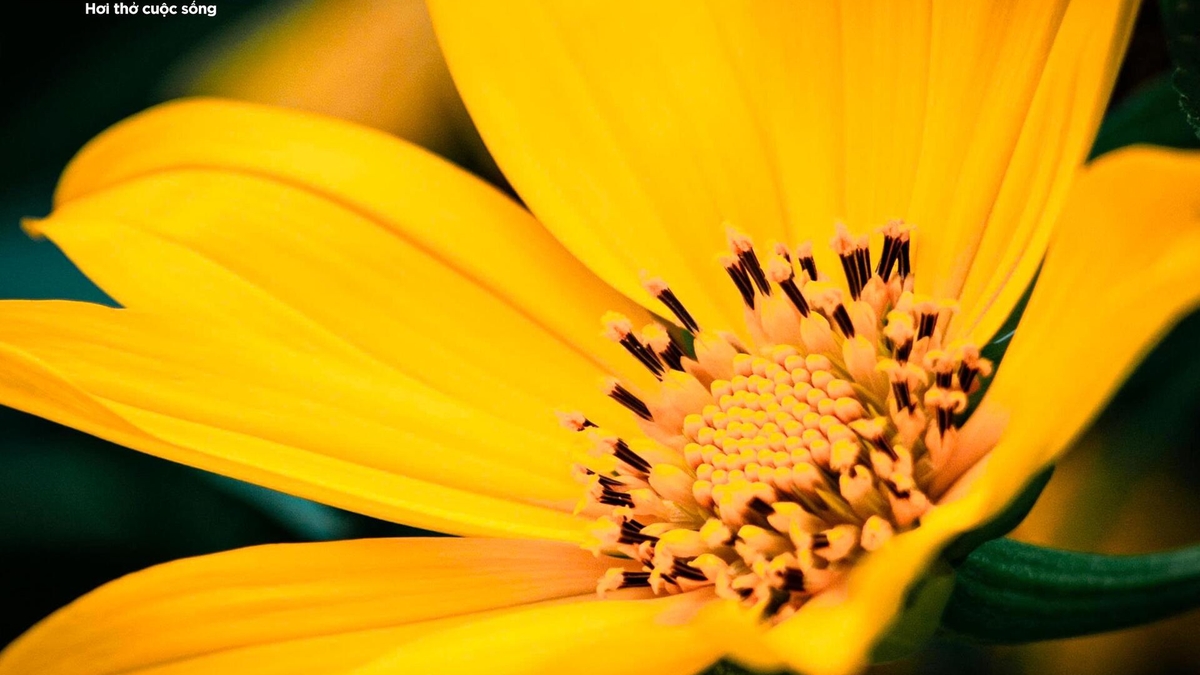
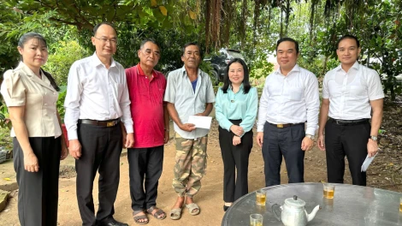




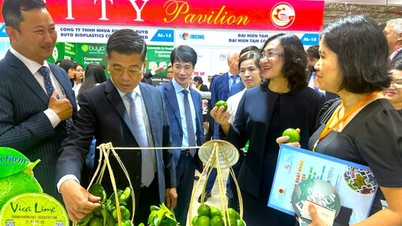
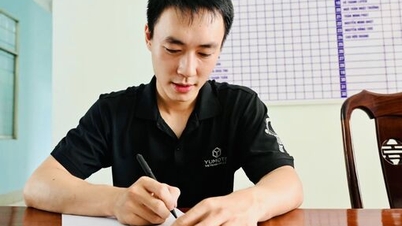
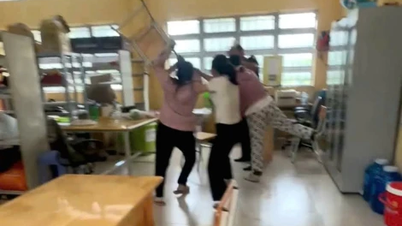





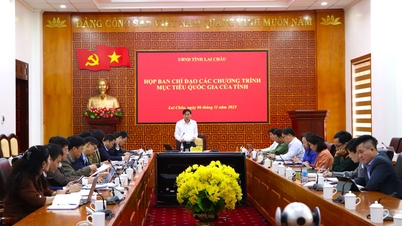
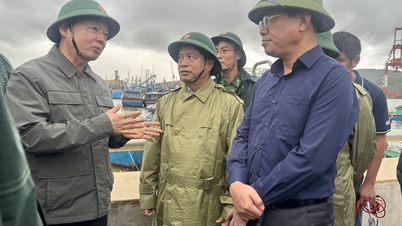

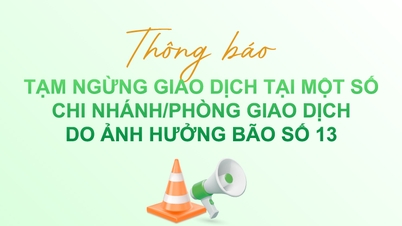

























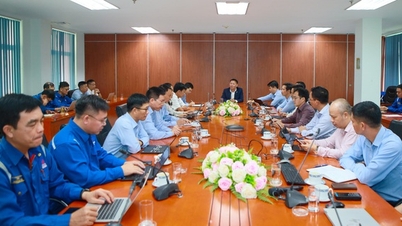




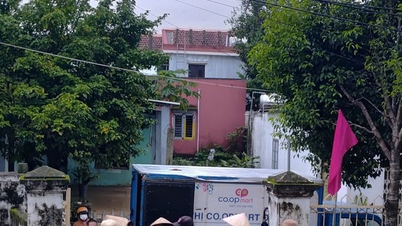
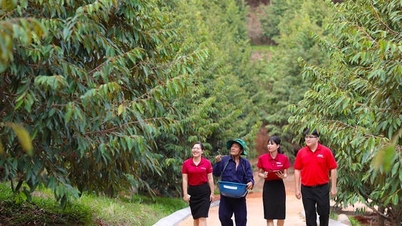







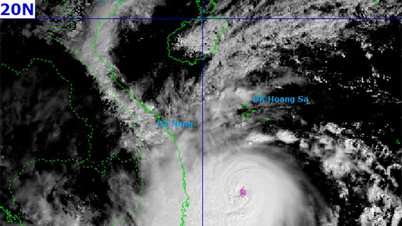






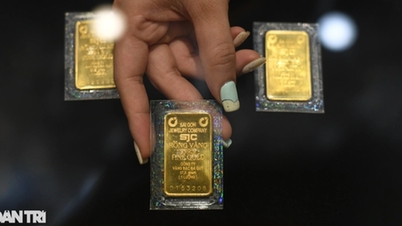





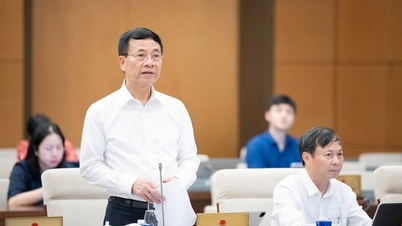


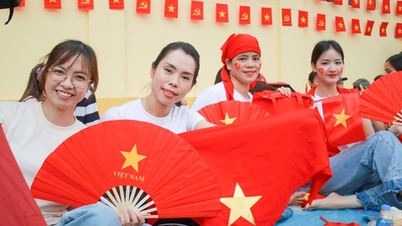

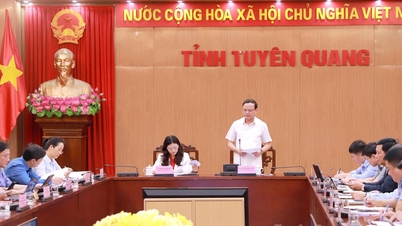

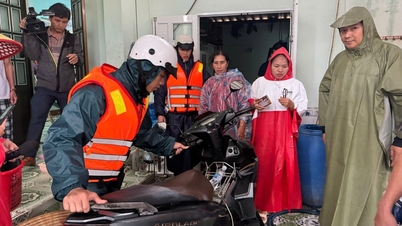

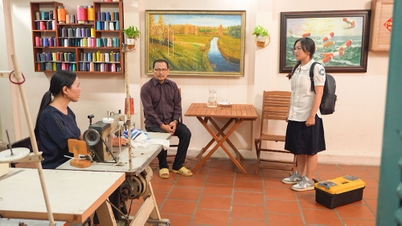


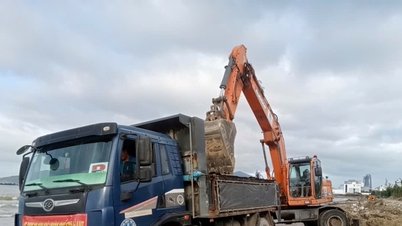

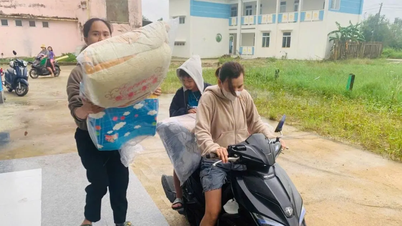









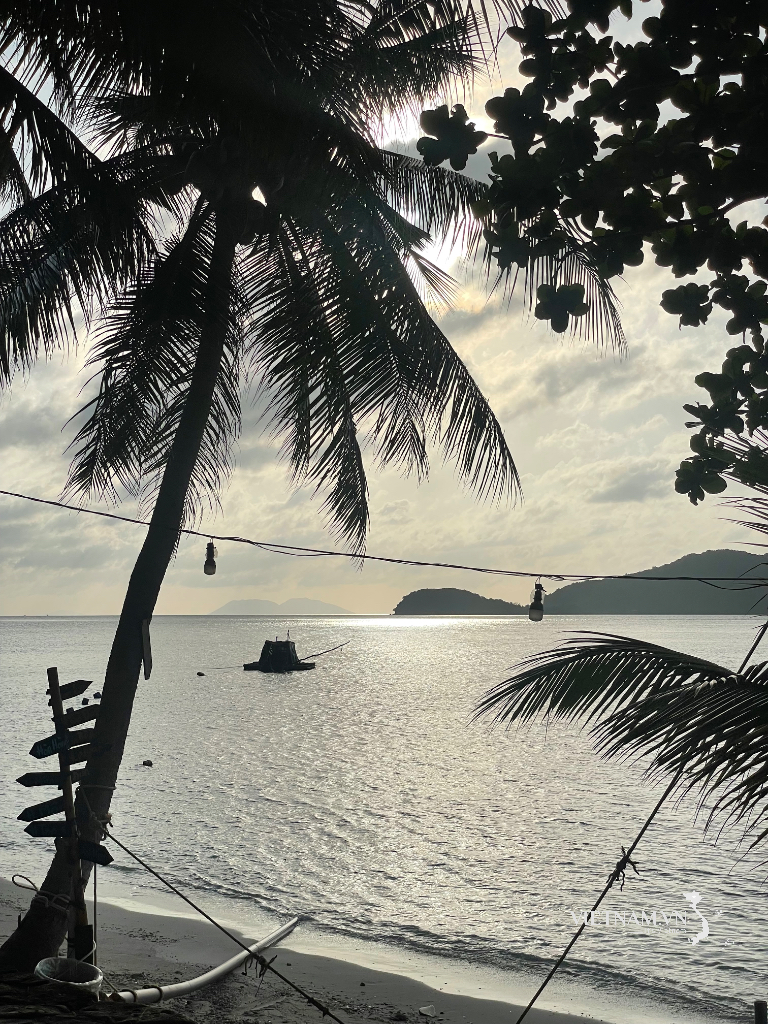

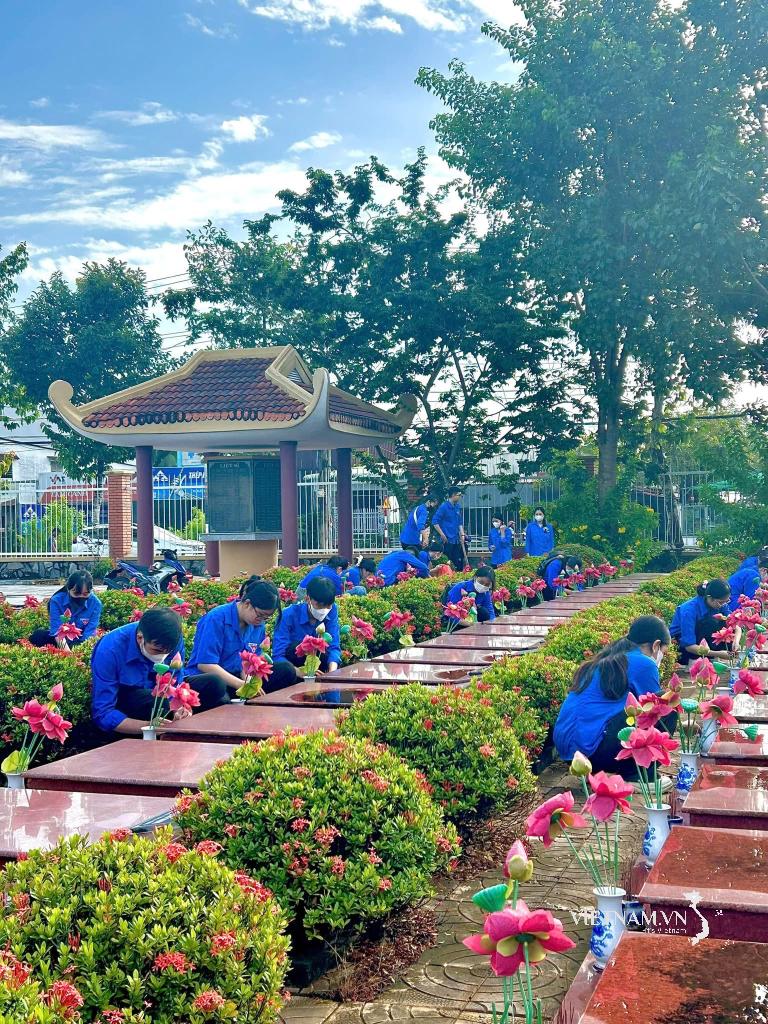
Comment (0)